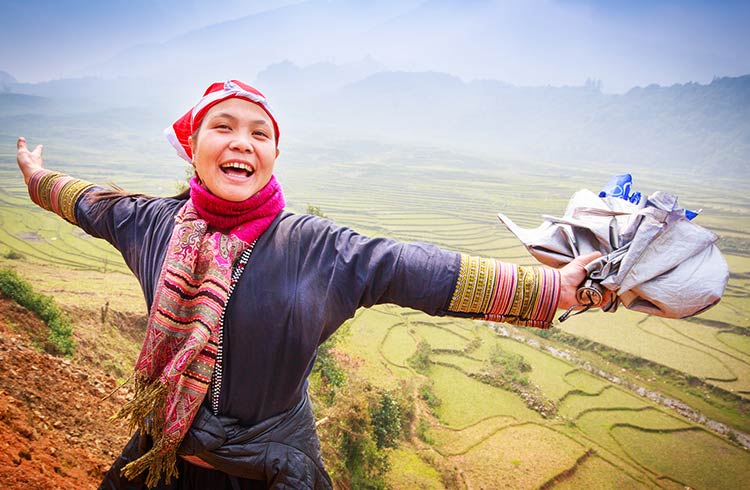How To Volunteer Overseas Without Breaking the Bank
Here are some things to keep in mind when you don’t have a lot of money, but want to donate your time and skills.
 Photo © Getty Images / Matt Porteous
Photo © Getty Images / Matt Porteous
It could be one of the most life-changing chapters in your life: the opportunity to contribute meaningfully to a remote location, to be out of your comfort zone, to learn about a community at the grassroots level, and to see the difference you can make to it.
You could be a soccer coach in Ghana or camped out in the Caribbean counting turtle eggs, empowering women in India, or doing an internship in a medical field that will help your education or career. You’ll be making an impact, but also making memories and perhaps a few friends for life along the way.
Volunteering across the world is a booming industry. Pre-pandemic, it was estimated that 10 million travelers worldwide worked on projects each year, spending more than $US1.5 billion. But as options have grown, so too has the microscope on the worthiness of projects. There have been many unscrupulous operators exploiting well-meaning volunteers and many communities for whom supposed “help” creates more disruption and dependency than aid.
There are ways to make sure your contribution is done in an ethical, sustainable manner and has a real, long-term benefit to the community you work with. It’s also important to make sure projects match your abilities and aims, whether you’re on a gap year or bringing a professional skillset, or on a career break or other avenue. Another big component to bear in mind is cost – what you’ll pay for the experience and where the money will go.
So, research is absolutely key. There are plenty of accredited organizations offering the experience and expertise to help, and lots of resources to find the right fit.
Why is volunteering so expensive?
You’re not just donating your time for free, you are buying an experience. For projects to function properly, they need to ensure costs are met – not least to keep you safe. Fees for programs – which can run into thousands of dollars – go towards funding your individual trip, as well as the overall set-up and running of the project you’re working on, and the wider services and admin of the volunteer organization to make sure it operates in a safe and supportive way.
Volunteer World is one of the biggest program comparison websites, with links to 1,600 projects globally and fees and breakdowns of what individual programs cover. You’ll find you can check dates and durations – the longer you stay, the cheaper it will be on a weekly basis – and what it includes. Airport transfers, accommodation, and food and drinks are usually covered; flights, travel insurance, vaccinations and visas will normally be additional costs.
Volunteer World does have a slider search filter on the costs of programs per week, so you can easily search through cheaper options. There are even programs without fees, but rarely will you find that transfers, housing, and food will be covered so you’ll still have to foot that bill separately – and be mindful of what you may miss out on in terms of wider support and sometimes quality.
How to choose the right project
It’s important to think long and hard about what you will be getting into. The main areas of volunteering include conservation and the environment, teaching, community-led projects with children or the elderly, or perhaps hands-on construction. Then there are more focused fields such as medicine, research, and humanitarian aid. You may find something that matches your university study or career aspirations, or where you can contribute with professional experience already gained.
The type of project you do should also influence the amount of time you should spend doing it – for example, it’s easier to dip in and out of conservation projects such as a beach clean-up over a few days, than a community project where it would be more meaningful to connect with people over a longer time.
It’s also essential to hunt out feedback from other participants. Check online reviews, not only of the company you go through, but of individual projects – many include ratings and reviews by previous volunteers, and most organizations are happy to put you in touch with people on the ground or other volunteers to help you with questions.
Volunteer for the right reasons
It’s important to ask why the project needs volunteers – that it’s not taking jobs from the local community and that your efforts will have a long-term benefit after you’ve gone. It’s also good to know what kind of training will be provided and what support will be in place. Make sure you have a clear picture of what your day-to-day life will be like before you commit.
You should be able to find statements of the values or missions of organizations when you begin your research, so you know they’re decent operators working in line with your own values. For example, WorkingAbroad takes a strong stance on supporting ethical volunteering with wildlife and makes sure its projects don’t involve anything beyond observing wildlife from a distance – so that’s absolutely no cub-petting or elephant rides.
African Impact, which has been running projects since 2004, says it ensures local communities have active ownership in running programs and want the projects and volunteers in the first place.
In summary, wanting to do good is not enough – so do your research to make sure the project is worthy of your time and money and creates true value for the community you’re aiming to help.
Related articles
Simple and flexible travel insurance
You can buy at home or while traveling, and claim online from anywhere in the world. With 150+ adventure activities covered and 24/7 emergency assistance.
Get a quote



2 Comments
With the right know-how, you can easily travel and volunteer abroad on the cheap, while also doing something meaningful. Thanks for sharing your tips.
Nancy
http://www.ranchodelicioso.com
I'm working on Air Conditioning industry since 1998 but I would like to teach my skills to others helping communities on places were people don't have opportunities.